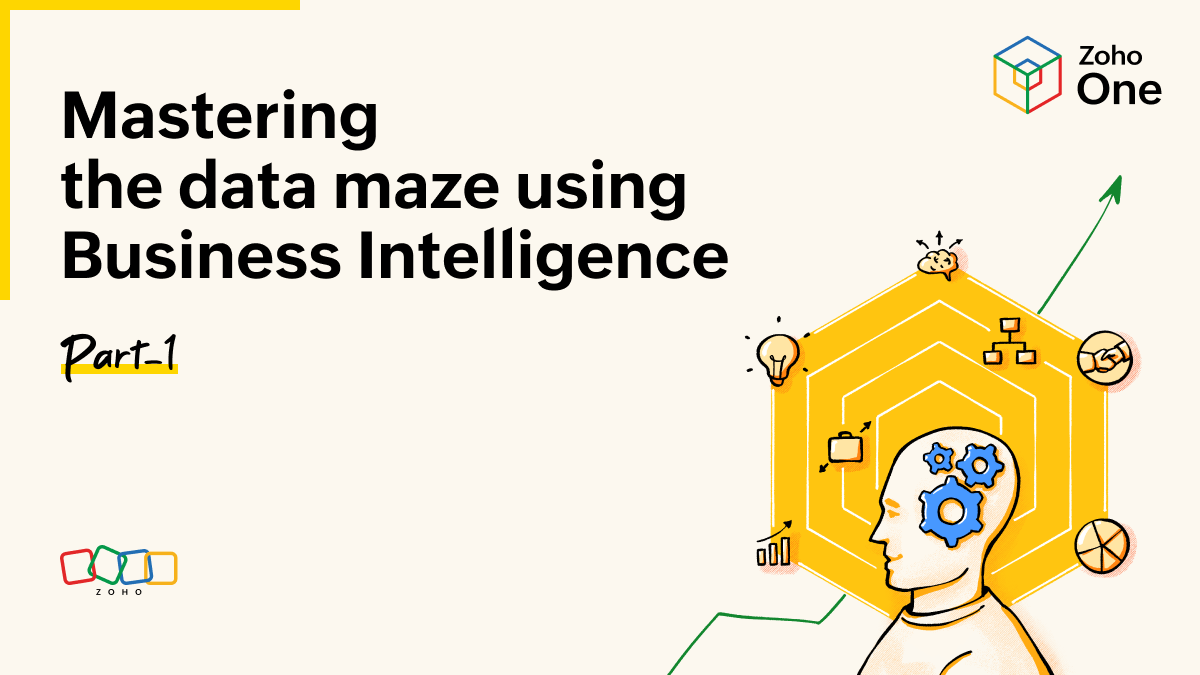Introduction
Mastering the data maze: Exploring business intelligence within Zoho One, Part 1:
With the plethora of software tools used by businesses to run various functions from sales, marketing, and support to project management, accounting, and the like, the volume of data accumulates to immense proportions over time. Even if a business uses a business management software (BMS), ERP, or other suites, making sense of all the data requires a robust business intelligence (BI) application.
In this blog series, we will first delve into the basics and benefits of BI, and then, in the subsequent parts, explore in detail how Zoho One, a comprehensive suite of business applications, empowers businesses with robust BI capabilities.

What is business intelligence (BI)?
Business intelligence (BI) encompasses a set of tools that gather and organize data from diverse sources into user-friendly formats, providing valuable insights about customer behavior, market trends, and operational efficiencies. It involves collecting and analyzing vast amounts of data, identifying patterns and trends, and translating them into actionable insights that steer decision-making processes.
Business intelligence within the context of BMS
BMS generates vast volumes of data on various aspects of a company, including sales, finances, inventory, and employee productivity. Interpreting such information can be overwhelming, and this is where business intelligence comes into play. It uncovers hidden patterns and relationships within the data that may not be readily apparent to human eyes. Put simply, BI extracts valuable data and presents it in visually appealing graphs and charts, making it easy to comprehend.
Major benefits of business intelligence
Improved decision making
BI is the helm that steers businesses toward success. Picture this: A retail giant, armed with business intelligence, analyzes sales data from various stores, identifies the products that are performing exceptionally well, and strategically stocks those items to meet customer demand. By leveraging real-time insights, they can make informed decisions about inventory management, marketing campaigns, and pricing strategies. This enables them to stay ahead of the competition and optimize revenue streams.
Increased transparency
Transparency is necessary for a well-functioning organization. Imagine a company with business intelligence capabilities that provide real-time visibility into its operations. Managers can track key performance metrics, identify bottlenecks, and proactively address issues before they snowball into major problems. This transparent environment fosters collaboration and empowers teams to work together towards shared goals. It’s like a well-lit room where everyone can see clearly and work efficiently, driving the organization forward.
Increased efficiency
Efficiency is the fuel that propels businesses toward their objectives. Business intelligence acts as the catalyst, enabling businesses to gather, analyze, and interpret large volumes of data quickly and efficiently. Instead of manually sifting through spreadsheets or databases, BI data preparation tools help correct, enrich, and prepare data through bulk updates and automation capabilities, allowing for faster and more accurate data analysis. This saves time and effort for employees involved in data processing and empowers them to focus on value-added tasks.
Higher business margins
The higher the business margins, the higher the morale of business heads, leading to better workflows and happier employees. Business intelligence acts as the compass that guides businesses toward cost reduction and revenue growth opportunities. Consider, for instance, a manufacturing company that analyzes its supply chain using embedded BI. By optimizing routes, consolidating shipments, and negotiating favorable contracts with suppliers, they unlock hidden cost savings and improve their profit margins. Simultaneously, business intelligence highlights new market segments and customer preferences, enabling targeted marketing campaigns and revenue expansion.
Competitive advantage
In the race for competitive advantages, business intelligence is the secret weapon in more ways than one. Visualize a technical startup that monitors its competitors’ activities using BI tools. By staying abreast of market trends, they can swiftly adapt their strategies, launch innovative products, and capture new market segments. This agile approach puts them ahead of the curve, leaving their competitors scrambling to catch up. Business intelligence arms organizations with the knowledge needed to outmaneuver rivals and secure a leading position in the market.
Better customer relationships
Building strong customer relationships is the cornerstone of business success. Say you own a service-oriented company that leverages business intelligence to gain deep insights into customer preferences and behaviors. What benefits would you reap? By analyzing historical data and understanding customer feedback, you can tailor your offerings, anticipate needs, and deliver personalized experiences. Just as a trusted friend remembers your preferences and surprises you with thoughtful gestures, your company cultivates loyal customers, who in turn become advocates for your brand.
Scalability
Scalability is the gateway to growth and expansion. Business intelligence serves as a strategic roadmap, guiding businesses to new horizons. How? An ecommerce company using BI to identify emerging markets with high growth potential can use this knowledge of consumer preferences and market dynamics to expand operations, penetrate new territories, and tap unexploited revenue streams with confidence. Business intelligence thus provides the blueprint for scaling businesses and seizing untapped opportunities.
Summary
BI, for the reasons mentioned above, has become increasingly significant as we transition from a data-centric era to a knowledge-centric one. It has become a vital asset for organizations striving to excel in a world driven by information. Businesses can maximize their competitive edge through BI by making informed decisions, streamlining operations, and fostering transparency. By providing access to valuable insights from large datasets, BI allows organizations to pinpoint growth areas, optimize efficiencies, and fuel financial growth.
As we embark on this blog series, we will dive deep into the business intelligence faculties of Zoho One, an integrated suite of 45+ applications. In the subsequent parts (Part 2 and Part 3), we’ll explore how it can revolutionize decision-making and propel businesses toward success.
Stay tuned for the next chapters as we uncover the specific features and functionalities of Zoho One‘s BI capabilities, and how they can transform the way you analyze and utilize data in your organization.
Categories Zoho One Tags #BusinessIntelligence #BI #ZohoAnalytics #ZohoOne #OperatingSystemforBusiness #OSforBiz
Author: Mani Prabhu
Posted On July 27, 2023
Source: https://www.zoho.com/blog/one/mastering-the-data-maze-exploring-business-intelligence-within-zoho-one-part-1.html

